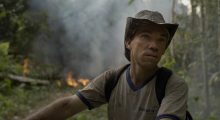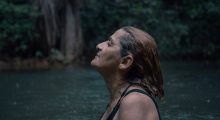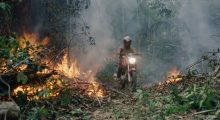17728 Results for “”
-
“Capturing the Scale of the Amazon Rainforest Is an Impossible Task”: DP Alex Pritz on The Territory

The Territory takes viewers deep inside the Brazilian Amazon, allowing them to bear witness to the ongoing conflict that has pitted Indigenous inhabitants against settlers looking to capitalize on the land. The film captures a pair of young leaders and their mentor, who defend the land with their lives, as well as settlers hoping to establish their own homestead, including those who engage in clear-cutting on their own. Director-cinematographer Alex Pritz explains how the film’s visual style distinguishes the different perspectives, his collaboration with an Indigenous cinematographer, and how his crew unexpectedly found themselves recording a settler burning down the […]
by Filmmaker Staff on Jan 22, 2022 -
“COVID Helped Us Discover a New Way to Create This Film” | Alex Pritz, The Territory

The last two years have prompted much contemplation and reconsideration of the reasons why we make our films as well as the ways in which we make them. What aspect of your filmmaking—whether in your creative process, the way you finance your films, your production methodology or the way you relate to your audience—did you have to reinvent in order to make and complete the film you are bringing to the festival this year? The Territory is a film about land conflict on Indigenous territory in the Brazilian Amazon, which has been co-created with the Uru-eu-wau-wau community. With the arrival of […]
by Filmmaker Staff on Jan 22, 2022 -
Sundance 2022 Critic’s Notebook: Mija, Mars One, Emergency

When does a virtual film festival start? The types of film screenings, audience accommodations, parties, panels, social spaces, diversity and development programs, residencies, labs, medical procedures and contingency plans film festival organizers are responsible for keep spiraling. The International Film Festival Rotterdam warned all attendees in late December that its 2022 edition would be entirely virtual, while the Berlinale recently confirmed the festival’s focus on in-person screenings would proceed as planned next month, without exception for press, but with a slightly expanded, all-virtual European Film Market. In this climate, Sundance announced a scant two weeks before the festival’s opening night that […]
by Abby Sun on Jan 22, 2022 -
“My Hope Is That These Amazonian Voices Are Heard”: Editor Carlos Rojas Felice on The Territory

The Territory, which highlights ongoing conflicts in the Amazon between its Indigenous inhabitants and Brazilian politicians and businessmen, was co-produced by the Uru-Eu-Wau-Wau community. The film thus grants first-hand views of the conflict, from the frequent invasions to the Indigenous peoples’ establishing of their own media team to broadcast their side of the story. Editor Carlos Rojas Felice explains how he retained the film’s environmentalist themes while highlighting the opposing views of the various players. Filmmaker: How and why did you wind up being the editor of your film? What were the factors and attributes that led to your being […]
by Filmmaker Staff on Jan 22, 2022 -
“It’s Always About Time and Not Having It”: DP Greta Zozula on Summering

With Summering, James Ponsoldt wanted to make a film that his young daughter would appreciate, and the result is a coming-of-age story about four girls planning one final weekend of fun before middle school. They unexpectedly make a discovery in the nearby woods that they keep to themselves, and from there imagination and reality collide in magical realist fashion. Below, cinematographer Greta Zozula explains how she managed the narrative’s tension between magic and realism and how the crew managed to make difficult scenes work with limited time. Filmmaker: How and why did you wind up being the cinematographer of your film? […]
by Filmmaker Staff on Jan 22, 2022 -
“The Movie We Made Is Really Very Close to the Movie I Imagined”: Editor Darrin Navarro on Summering



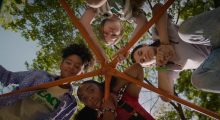
Summering is James Ponsoldt’s ode to childhood in which four girls who discover something in the woods and make a questionable decision to keep it a secret and solve the mystery on their own. The coming-of-age story also has elements of both horror and magical realism, and keeping close to the perspective of its characters while staying tethered to the reality was crucial for the film. Editor Darrin Navarro discusses striking that balance and how altering the structure of the film gave the audience a way into the narrative. Filmmaker: How and why did you wind up being the editor […]
by Filmmaker Staff on Jan 22, 2022 -
“Perhaps It’s a Miracle to Make Films” | Ricky D’Ambrose, The Cathedral

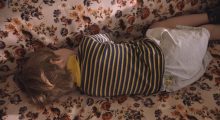
The last two years have prompted much contemplation and reconsideration of the reasons why we make our films as well as the ways in which we make them. What aspect of your filmmaking—whether in your creative process, the way you finance your films, your production methodology or the way you relate to your audience—did you have to reinvent in order to make and complete the film you are bringing to the festival this year? Filmmaking has always been, since my earliest childhood experiments with a camera, a circumscribed activity—typically thankless, fueled by begrudging favors and cut-rate fees, a marginal and […]
by Filmmaker Staff on Jan 22, 2022 -
“I Wanted to Restrict Lighting That Didn’t Feel Naturally Motivated”: DP Barton Cortright on The Cathedral


With The Cathedral, an unseen narrator relates the life of Jesse Damrosh, beginning with the dissolution of his parents’ marriage and highlighting other hallmarks of middle-class American existence. D’Ambrose lingers not on the big life events, however, but the more quotidian and quieter moments and objects that leave indelible marks on one’s memory. Cinematographer Barton Cortright explains why natural light was the correct approach for the film, and how he amplified the natural look to avoid a shallow depth of field. Filmmaker: How and why did you wind up being the cinematographer of your film? What were the factors and attributes […]
by Filmmaker Staff on Jan 22, 2022 -
“The Challenges We Had Were All Related to Nature”: DP Barbara Alvarez on Utama

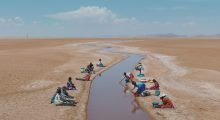
In Alejandro Loayza Grisi’s Utama, an ailing man tries to persuade his elderly Quechuan grandparents weathering a drought on the Bolivian Altiplano to move away from their lifelong home and join him in the city. Shot on location, the film portrays the daily routines and relaxed pace of life as well as the climate threat residents of the Bolivian highlands face. Below, cinematographer Barbara Alvarez recounts how the climate created difficulties in production and how she captured the tension between the harshness and the beauty of the location. Filmmaker: How and why did you wind up being the cinematographer of […]
by Filmmaker Staff on Jan 22, 2022 -
“Real Healing Means Taking All Our Vulnerabilities and Weaknesses and Realizing They’re Also the Source of Our Humanity” | James Ponsoldt, Summering




The last two years have prompted much contemplation and reconsideration of the reasons why we make our films as well as the ways in which we make them. What aspect of your filmmaking—whether in your creative process, the way you finance your films, your production methodology or the way you relate to your audience—did you have to reinvent in order to make and complete the film you are bringing to the festival this year? I think my focus sharpened. And my absolute need to make the film—I had to make it. So much of Summering is about children and their […]
by Filmmaker Staff on Jan 22, 2022
